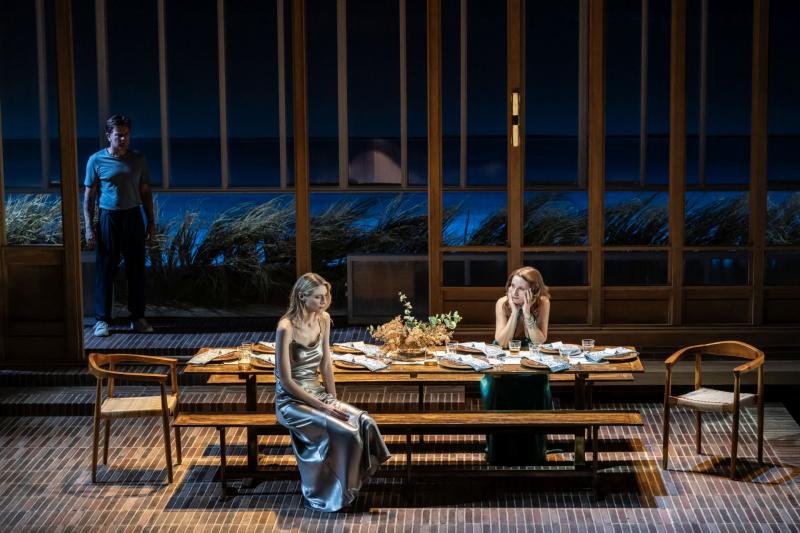
Booking the tickets, I had clocked the reference to ‘Ibsen’ – but not being an Ibsen aficionado, I had no expectations regarding the storyline. Now that I have skimmed a summary of the original plot, “inspired by Ibsen” seems a bit of a stretch. Maybe an “echo” or “impression” of Ibsen’s fictionalised attempt at exonerating his own obsession with a younger woman; definitely not a modernisation or rewrite.
But as I had never read or seen the original, Lila Raicek’s interpretation was for me simply a play to be enjoyed at face value. And although slow at times, it left me pondering over various interactions long after the applause had died down, all the while basking in the afterglow of the gorgeous set and lighting, reminiscent of a mixture of Seurat’s Bathers at Asnières and Edward Hopper’s Rooms by the Sea.
Naturally, what captivated me the most was the dynamic between the women. The ‘starchitect’ played by undeniably the biggest start of the show – McGregor – is anything but the centre of this production. The juxtaposition between him and the leading women is both visible and tangible. His electrifying wife has all the cutting lines and emotional takes; his tall, lanky love interest towers over him, turning McGregor’s signature boyish looks into something stout and frumpy – it is he who is said troll, not her. He might have the majority of lines, he might take up more stage time and space – but like so often it is in life – that is just an illusion – and it is the women who are actually the drivers and the stars, set against the mediocre men that are idolised.
Each of these women is impressive in their own right. And yet they are pitted against one another in a permanent competition, fighting for the attention of men, needing their approval to assuage their insecurities. There is “slut-shaming”, there is denunciation, there is ridicule, there is mockery. The women continue to sabotage one another to procure the attention of men whom deep down inside they do not really want or desire. Agency is defined not by reference to the world, but by reference to the men that co-inhabit a woman’s space. This is frankly tragic, especially when you take a step back and realise how irrelevant and pretty much spare the central male protagonist actually is. And yet the two women consume themselves for him.
The play also made me question power dynamics. Who has the upper hand in the “master builder – troll” relationship; who has taken advantage of whom; who holds power now and who held it then? Was it the older, accomplished man in a teacher student relationship; or the young, beautiful, innocent student well aware of the older man’s trauma? Again, this juxtaposition is emphasised by the girl’s looming height and the naivety displayed by the so-called master, who seems to be genuinely in love. Rather than an egotistic, narcissistic maniac, we encounter a tormented man, abandoned by his grieving wife, desperate for a meaningful connection.
It also made me wonder why would Elena actively brings Hilda back into their lives – was she looking for a resolution or a reckoning, or was it a last bid attempt to stop the slow seething resentment from poisoning what was left of her life? She is so deeply miserable – on one hand, seeking validation in a younger man’s eyes; on the other hoping that confronted with the younger woman, her husband will, against all odds, end up choosing her.
And maybe he would have, if she had not pushed him so hard, if she had not failed to realise that both of them yearn for a bridge back to younger days, the days before they were subsumed by tragedy. It is not physical attraction that binds Henry to Hilda, it is the time machine that her presence offers – a ride back to a period before the bitterness had set in.
Leave a Reply